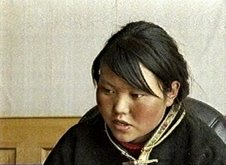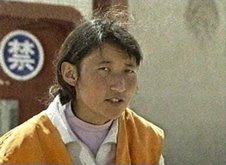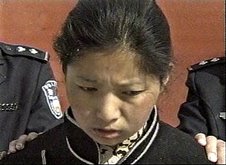 Dharamshala: TibetPost-21-April-2009-China's official news agency, Xinhua announced today that one Tibetan has been sentenced to death with a two-year reprieve and two others to long jail terms for so called starting of deadly fires in the Tibetan capital Lhasa riots last year. Earlier this month, the Chinese court in Lhasa sentenced two Tibetans to death, two to suspended death penalties and another to life in prison on charges of involvement in last March's unrest.
Dharamshala: TibetPost-21-April-2009-China's official news agency, Xinhua announced today that one Tibetan has been sentenced to death with a two-year reprieve and two others to long jail terms for so called starting of deadly fires in the Tibetan capital Lhasa riots last year. Earlier this month, the Chinese court in Lhasa sentenced two Tibetans to death, two to suspended death penalties and another to life in prison on charges of involvement in last March's unrest.According to Xinhua, "a Chinese court has sentenced one woman to death with a two-year reprieve and two others to long jail terms for setting fires that killed six people in the Lhasa riot last year, the Tibet Daily reported Tuesday."
A Tibetan woman, (age not conformed) "Penkyi, of Sagya (Sakya) County, received the suspended death penalty for starting fires in two downtown clothing shops on March 14, a spokesman Chinese Municipal Intermediate People's Court in Tibetan capital Lhasa told the newspaper the 'Tibet Daily."
 According to Xinhua, of those convicted, "she lit a blaze in Hongyu Trousers on the Qingnian road, completely destroying the shop and killing shop owner Zuo Rencun. The economic loss was put at 250,000 yuan, then Penkyi along with Penkyi, of Nyinmo County, and Chimed went to Yishion clothing store on the East Beijing Road. The latter two threw the clothes on the ground while Penkyi, of Sagya, lit a fire."
According to Xinhua, of those convicted, "she lit a blaze in Hongyu Trousers on the Qingnian road, completely destroying the shop and killing shop owner Zuo Rencun. The economic loss was put at 250,000 yuan, then Penkyi along with Penkyi, of Nyinmo County, and Chimed went to Yishion clothing store on the East Beijing Road. The latter two threw the clothes on the ground while Penkyi, of Sagya, lit a fire."Chinese authorities claimed that five of the shop's six staff, aged 17 to 23, died in the blaze. Property losses were put at 1.5 million yuan, but the true situations inside Tibet is still known with heavily deployed military armed forces and the prohibiting of international media access.
The spokesman for the Chinese court in the capital Lhasa said, "These arsons were among the worst crimes. They led to the extremely serious consequences, resulted in great loss of life and property and severely undermined social order, security and stability."
 Tibetan woman, 23 years old, Penkyi, from Nyinmo county, western Tibet "was sentenced to life imprisonment and Chimed (Chimed Lhamo, Tibetan woman 20 years old) was jailed for 10 years, the court showed leniency on the two Penkyis, who were described as the principal instigators of the arsons, as they had turned themselves in to police," Xinhua continued.
Tibetan woman, 23 years old, Penkyi, from Nyinmo county, western Tibet "was sentenced to life imprisonment and Chimed (Chimed Lhamo, Tibetan woman 20 years old) was jailed for 10 years, the court showed leniency on the two Penkyis, who were described as the principal instigators of the arsons, as they had turned themselves in to police," Xinhua continued."The trials had been open and strictly abided by the Criminal Procedure Law of the People's Republic of China. The defendants were provided with Tibetan language interpreters and their attorneys had expressed their arguments in full," the spokesman said.
"The report did not say when the sentences were delivered nor did it give other details of the defendants and their arguments," The state media Xinhua claimed.
After the deadly Chinese crackdown on Tibetan peaceful demonstrators in all parts of Tibet,the Chinese court in Tibet sentenced five Tibetans to death, 3 death penalties, two to suspended death penalties, two to life in prison and one jailed for ten years on charges of arson causing death. The eight were convicted of torching five shops in Lhasa, killing seven people, during the March 14 riot.
Xinhua claimed earlier this month that the crimes of the five Tibetan defendants resulted in seven deaths and the destruction of five shops in the Tibetan capital, Lhasa. The Chinese government also claims that Tibetan rioters were responsible for 21 deaths, while the Tibetan government in exile hold that it was over 220 Tibetans killed, 1,294 injured and 290 sentenced, more than 5,600 were arrested or detained and over 1,000 disappeared.
Under China's "Two-Year Human Rights Action Plan" issued on 13 April of this year, the Chinese government claims that "every precaution will be taken" in sentencing prisoners to death, and that "the system of the death sentence with a two-year reprieve shall be improved". It has become apparent in recent days, however, that the trials given to these sentenced prisoners in Tibet were neither free nor fair. Tibetans have no right to express their political opinions in their own country, nor are they given the right to religious and cultural freedoms.


![Tibet has a rich history as a sovereign nation until the 1950s when it was invaded by China. [Photo: File]](/images/stories/Pics-2024/March/Tibet-Nation-1940s.jpg#joomlaImage://local-images/stories/Pics-2024/March/Tibet-Nation-1940s.jpg?width=1489&height=878)















